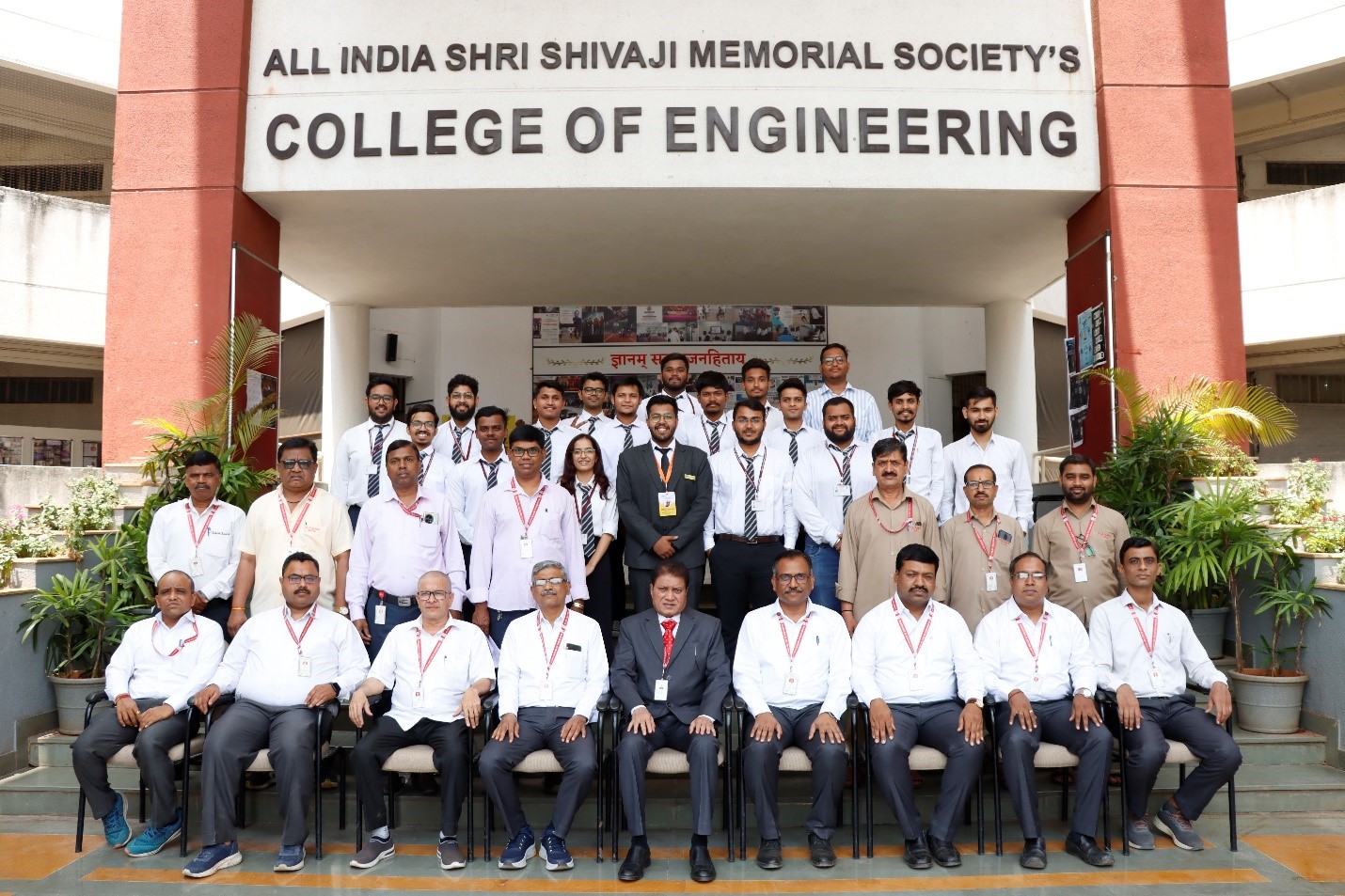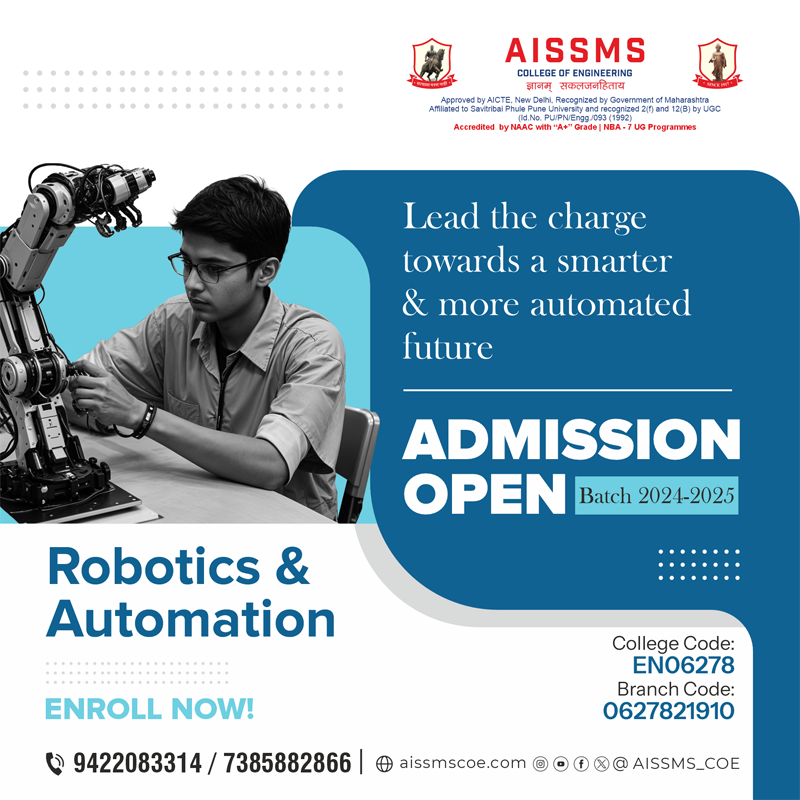

The department of Robotics and Automation is recently established with the Institute with an intake capacity of 30 starting from 2022-2023 and 60 from 2024-25. This program is approved by AICTE, New Delhi, and Affiliated with the Savitribai Phule Pune University, Pune, (MH), India.
Robotics is an emerging multi-disciplinary course that requires profound application-based knowledge in hardware as well as software development, which comprises the design, construction, operation, and application of robots. To remain competitive in the market, Indian industries will have no choice but to adopt the advanced technologies of Robotics and Automation. Therefore, there will be a huge need for robots and thereby robotics engineers in near future. In the new industrial revolution of Industry 4.0, there is a need to understand multidisciplinary concepts for an engineer to work on an industrial assignment.
The design of a robotic system that puts together principles of Mechanical Engineering, Manufacturing Engineering, Electrical / Electronics Engineering, and Computer Engineering is necessarily a part of every Organization. The opportunities for a Robotics and Automation Engineer are multifold as the industry is booming up with advanced concepts like smart manufacturing, Robot Programming, Industrial Automation, Manufacturing, Agriculture, Mining, Aerospace, Healthcare, and Defence.
Vision:
- To produce responsible professionals in the field of Robotics & Automation Engineering.
Mission:
- Impart state of art technical education in Robotics & Automation Engineering.
- Inculcate sustainable skills in automation technologies, research and learning attitudes.
- Committed to fulfil the needs of society in the manufacturing and service sector.
- Prepare individuals with the ability to fulfil social responsibilities.
Program Outcomes(PO):
| PO1 | Engineering Knowledge | Applying knowledge of mathematics, natural science, engineering fundamentals, and the chosen engineering specialization to solve complex problems. |
| PO2 | Problem Analysis | Identifying, formulating, reviewing research literature, and analyzing complex engineering problems to reach substantiated conclusions. |
| PO3 | Design/Development of Solutions | Designing creative solutions for complex engineering problems, developing system components or processes to meet specified needs while considering public health and safety, and environmental concerns. |
| PO4 | Conduct Investigations of Complex Problems | Conducting investigations of complex problems using research-based knowledge and research methods including design of experiments, analysis and interpretation of data, and synthesis of information to reach valid conclusions. |
| PO5 | Modern Tool Usage | Selecting and applying appropriate techniques, resources, and modern engineering and IT tools, including prediction and modeling, to complex engineering activities with an understanding of their limitations. |
| PO6 | The Engineer and Society | Applying reasoning informed by the contextual knowledge to assess societal, health, safety, legal, and cultural issues and the consequent responsibilities relevant to professional engineering practice. |
| PO7 | Environment and Sustainability | Understanding the impact of professional engineering solutions in societal and environmental contexts, and demonstrating knowledge of and need for sustainable development. |
| PO8 | Ethics | Applying ethical principles and commit to professional ethics and responsibilities and norms of engineering practice |
| PO9 | Individual and Team Work | Function effectively as an individual, and as a member or leader in diverse teams, and in multidisciplinary settings. |
| PO10 | Communication | Communicating effectively on complex engineering activities with the engineering community and with society at large, such as being able to comprehend and write effective reports and design documentation, make effective presentations, and give and receive clear instructions. |
| PO11 | Project Management and Finance | Demonstrate knowledge and understanding of engineering and management principles and apply these to one’s own work, as a member and leader in a team, to manage projects and in multidisciplinary environments. |
Program Specific Outcomes (PSO):
- Graduates will be able to design and implement robotic systems that meet specified performance criteria.
- Graduates will be able to analyze and optimize automation processes in manufacturing, healthcare, and other industries.
- Graduates will be able to communicate effectively in interdisciplinary teams, working collaboratively with professionals from diverse fields such as mechanical engineering, computer science, electrical and electronics engineering.
Program Educational Objective (PEO):
- Graduates will have a deep understanding of the principles, theories, and practices in robotics and automation engineering. They will have the skills necessary to create, design, and manage complex robotic systems. Graduates will also have a solid foundation in mechanical, electrical and electronics engineering, as well as computer science.
- Graduates will be prepared to design and implement robotic systems that are not only technically proficient but also socially responsible.
- Graduates will have an understanding of the ethical considerations involved in the use of robotic systems, such as privacy, safety, and security. They will also be aware of the social implications of robotics and automation, such as job displacement, and be equipped to address these issues in their work.